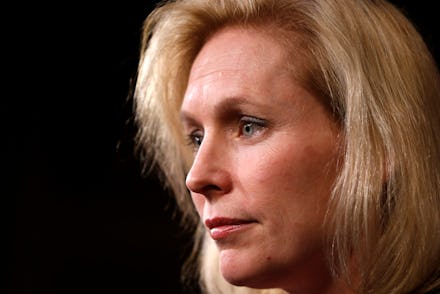Absurd Treatment of Kirsten Gillibrand Reveals Disgusting Side of Washington's 'Boys Club'

Male entitlement is everywhere — even in those hallowed halls of Congress.
You'd think a stellar resume — and the fact that she's the widely popular U.S. senator from New York — would shield Kirsten Gillibrand from the body shaming that so many of her constituents endure during their daily lives. Sadly, according to her yet-to-be released memoir, Gillibrand has been the target of similar disrespect, this time at the hands of her colleagues — fellow elected officials in Washington.
In the memoir Off The Sidelines, Gillibrand shares painful memories of male colleagues scrutinizing her weight, making her the subject of harassment and objectification. In one instance, revealed in an interview with People posted online this week, a male senator came behind Gillibrand soon after she had taken her oath of office, squeezing her stomach while saying, "Don't lose too much weight now... I like my girls chubby."
The saddest part of that story? Gillibrand told People that the "chubby-chasing" colleague was actually one of her favorite senators.
Given the many stories of everyday sexism women have suffered at the hands of the old boys' club in Washington, it's not a huge surprise to hear Gillibrand suffered from this kind of workplace harassment. In another story, when Gillibrand was using the Senate gym, a male colleague told her: "Good thing you're working out because you wouldn't want to get porky!" Another time, a Southern congressman told her, "You know, Kirsten, you're even pretty when you're fat."
These types of remarks — whether directed at a senator or any other woman — reinforce the troubling double standard that exists for men and women in the workplaces. By and large, men aren't subjected to the same scrutiny women face when it comes to their appearance, clothing style and weight. In Washington, Gillibrand colleagues, House Minority Leader Nancy Pelosi and former Secretary of State Hillary Clinton, have been hit particularly hard by this type of commentary.
Some of the responses to Gillibrand's revelations makes her story even more infuriating. ThinkProgress notes that "a cadre of mostly male reporters took to the airwaves and Internet to question her credibility" after the interview was posted, with journalists like the New York Times' Nick Confessore going so far as to claim Gillibrand has a "responsibility" to name her fat-shamers:
Actually, no. Gillibrand and her female colleagues are already under a huge amount of pressure, both due to their minority status and the whole host of other complicated workplace guidelines women are supposed to observe. Just this week, Fortune's Kieran Snyder conducted reviews of high-achieving men and women in tech fields and found that women received much more critical feedback than their male counterparts, and were more likely to be dinged for being too assertive or "abrasive."
Then there's the issue of potential retaliation.
"There's a lot at stake for men and women who come forward to talk about a hostile environment and workplace harassment," Fatima Goss Graves, vice president for Education and Employment at the National Women's Law Center, told ThinkProgress.
"Retaliation is very real, and it could come in the form of losing your job altogether or your boss making life your life terrible by controlling which job assignments you get, and whether you get a promotion or the pay you deserve. It could even take the form of additional sexual harassment. That's why some people don't want to pay the price for speaking out."
Image Credit: Associated Press
In a 2013 gender equality report authored by the World Economic Forum, the U.S. was ranked a disappointing 60th out of 136 countries in terms of political parity between the genders: Female representation in politics continues to be one of the biggest gender gaps that women face in the United States. Despite high-profile examples like Clinton, Gillibrand, Pelosi and others, women make up only about 24% of all state legislators, according to the National Conference of State Legislatures, and there are only 20 women currently serving in the 100-person U.S. Senate.
We need more women in politics, not less. But go ahead, Nick, try and shame this trailblazing senator for not naming names.
For now, Gillibrand appears to be giving some of her co-workers a break for their backward attitudes.
"It was all statements that were being made by men who were well into their 60s, 70s or 80s," she told People. "They had no clue that those are inappropriate things to say to a pregnant woman or a woman who just had a baby or to women in general."
Slate's Amanda Marcotte, however, wondered if this wasn't more of a survival tactic than anything else.
"Sometimes this kind of boundary-testing and harassment is done out of malice, a desire to put a woman in her place," she wrote. "And yes, as Gillibrand says, sometimes it's a matter of ignorance. There are men who are so used to thinking of women as nothing but sex objects that they're incapable of treating them with the same respect they offer their male colleagues.
"But it doesn't really matter if the harasser is a jerk or a fool. This behavior is still unacceptable."